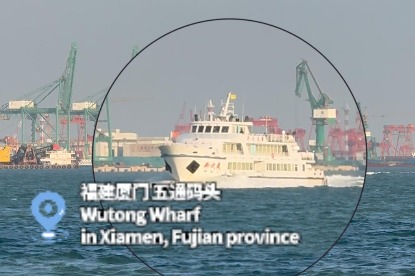Manufacturing complex for carrier rockets nears completion in Wuhan
By Zhao Lei | China Daily | Updated: 2019-11-20 09:19
A new manufacturing complex for carrier rockets will soon be built and start operation, according to a project insider with China Aerospace Science and Industry Corp, the major investor in the base.
Construction of the complex, part of the Wuhan National Space Industry Base, will be completed around the end of this year and the complex will have an initial production capacity of 20 Kuaizhou-series solid-propellant carrier rockets, said Zhang Di, a senior rocket scientist and chairman of Expace Technology, a CASIC subsidiary in Hubei province's Wuhan that builds the Kuaizhou rocket.
The complex's infrastructure construction began in October 2017 and has recently been finished.
Currently, engineers and technicians are installing and fine-tuning equipment, Zhang told China Daily on the sidelines of the 5th China International Commercial Aerospace Forum when it opened on Tuesday in Wuhan.
More than 300 researchers, executives and government officials will take part in the two-day forum, the largest of its kind in China.
"After the complex starts operation, we will be able to assemble at least 10 Kuaizhou 1As and at least 10 Kuaizhou 11s on an annual basis," Zhang said. "If demands in our rocket keep increasing, we will expand the annual production capacity to 30."
Before the end of 2020, his company plans to carry out more than 10 Kuaizhou 1A launch missions for clients, he said.
Upon its completion, the Wuhan National Space Industry Base will cover 68.8 square kilometers in Wuhan's Xinzhou district. It aims to attract at least 100 enterprises involved in the space industry before 2020 and generate an annual gross product of 30 billion yuan ($4.36 billion) by that time, according to CASIC.
CASIC began to develop the Kuaizhou series in 2009 as a lowcost, quick-response product for the commercial space market. Kuaizhou is the largest solid-propellant rocket family in China, as opposed to the Long March series that mainly relies on liquid fuel.
The State-owned space conglomerate has launched two Kuaizhou 1s and five Kuaizhou 1As.
In another development, Zou Guangbao, general manager of CASIC Space Engineering Development in Beijing, said on Tuesday during the aerospace forum that a satellite production complex that was mainly invested in by his company is nearing completion and will be put into operation in 2020.
He said that the complex will be tasked with researching, designing and making small satellites and will be capable of building more than 100 satellites each year.
























